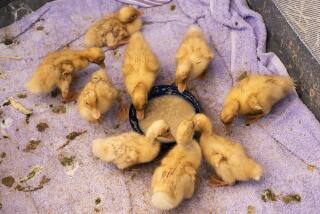‘Rehabbers’ perform a grueling labor of love
- Share via
They’re kidnapped by children or captured by cats.
They’re cut down by tree trimmers or toppled by winds.
Some fly into walls or windows, while others see their parents injured in territorial feuds.
For baby hummingbirds, the summer is a time of great peril.
But fortunately for hundreds of these tiny, battered creatures, there’s a subculture of people who are eager to step in as surrogate parents. The volunteers, or “hummingbird rehabbers,” devote themselves to raising hummingbird orphans and nursing injured fledglings and adults back to health so they can be returned to the wild.
When the summer arrives -- and with it, new hatchlings -- the work is an all-consuming, around-the-clock affair.
“Only a crazy person would do this,” said Terry Masear, 50, who has had as many as 60 hummingbirds at a time flitting around in the cages on her back patio in West Hollywood.
Masear is one of the two volunteer hummingbird rehabbers working under the umbrella of the nonprofit South Bay Wildlife Rehab, one of the few organizations in Southern California that take in hummingbirds.
During the summer, she takes a three-month hiatus from her job teaching English to foreign professionals at UCLA. Far from being a break, her summers with the hummingbirds entail 15- to 17-hour days of nonstop work.
Part of the work involves public education -- explaining to callers that a mother is probably still feeding her babies even if she is no longer sitting on the nest, or coaching callers on how to care for an injured bird until they can bring it in for help.
But most of the job is manual labor. From 5 a.m. to nightfall, every half hour, pre-fledgling hummingbirds must be fed with a syringe full of a special formula made in Germany. Masear guides a tube down the throats of the little birds, not much larger than bumblebees. Between feedings, she changes feeders for the older birds, cleans cages and monitors the birds’ social interactions.
“You can’t go out to dinner, you can’t go out of town. You don’t have a life,” Masear said.
Masear had no idea what was in store for her seven years ago when her Abyssinian cat escaped from the house during a windstorm and came back with an unharmed fledgling in its mouth. After a few phone calls, she took the bird to South Bay hummingbird rehabber Jean Roper.
The next year, Masear took Roper a crop of babies whose nest had been destroyed in a storm. In 2005, under Roper’s tutelage, Masear began rehabbing birds herself.
In order to care for hummingbirds in California, rehabbers must obtain wildlife rehabilitation permits from the state and federal governments. For those without licenses, keeping hummingbirds in captivity is a crime. In 2008, the most recent year for which statistics are available, the California Department of Fish and Game reported that 1,234 hummingbirds were taken by members of the public to licensed rehab facilities in Los Angeles, Orange, San Diego, Santa Barbara and Ventura counties.
Last year, South Bay Wildlife Rehab took in more than 400 hummingbirds, according to director Ann Lynch.
Within a few weeks, the baby birds graduate from an incubator in Masear’s garage to mesh cages on the patio. There, they learn to eat out of a feeder and develop such skills as perching, hovering and doing a 360-degree turn in the air.
Finally, they move on to a 7-foot cylindrical aviary with a hanging flower basket and a small ficus tree. When they are ready to live in the wild, Masear opens the aviary door and watches the tiny birds spiral hundreds of feet into the air and disappear among the clouds.
Even after seeing it hundreds of times, that moment still makes the long hours of drudgery worthwhile, she said: “When you release them, that’s pure joy.”
For more information about hummingbird rescue in Los Angeles, visit www.losangeleshummingbird rescue.com.
--
(BEGIN TEXT OF INFOBOX)
Hummingbird tips
The rehabbers have some advice:
DO:
* Call a licensed wildlife rehab facility if you find an injured or orphaned bird.
* Clean feeders regularly. Fill with one part white sugar to four parts water.
DON’T:
* Assume that baby birds are abandoned because you don’t see the mother. After a few weeks, she stops sitting on the nest and returns only briefly to feed them.
* Keep hummingbirds in captivity or try to raise them yourself. It’s illegal.







